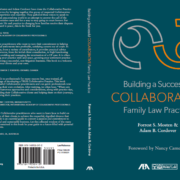Collaborative Law Process Act Protects Families’ Privacy
Last Friday, the Florida Senate passed its version of HB-967, the Collaborative Law Process Act, priming Florida to become the 14th state to pass a version of the Uniform Collaborative Law Act.
The bill, which was voted on in the Florida Senate by 39-0 after passing the Florida House last month by 117-0, is now enrolled and expected to be signed by the governor. At the earliest, the Collaborative Law Process Act becomes binding on July 1, 2016. However, it may take longer, as the bill itself states that it will not go into effect until 30 days after the Florida Supreme Court adopts Rules of Procedure and Rules of Professional Responsibility consistent with the bill. It is my understanding that proposed rules have been provided or will be provided to the Supreme Court.
[Update: On March 24, 2016, Governor Scott Signed the Collaborative Law Process Act]
The Collaborative Law Process Act, which applies to divorce, paternity, and other family law matters, does several things:
-It creates a uniform system for the practice of collaborative law, which is a non-adversarial form of dispute resolution where all energy, time, and money is spent on reaching an agreement rather than fighting in court;
-It restates that it is the policy of Florida for families to engage in the peaceful and early resolution of disputes;
-It confirms that the collaborative law process is “a unique nonadversarial process that preserves a working relationship between the parties and reduces the emotional and financial toll of litigation;”
-It defines the Collaborative Law Process as “a process intended to resolve a collaborative matter without intervention by a tribunal and in which persons sign a collaborative law participation agreement and are represented by collaborative attorneys;”
-It states that “the collaborative law process begins, regardless of whether a legal proceeding is pending, when the parties enter into a collaborative law participation agreement;”
-It codifies that, except under limited circumstances, communications made during the collaborative law process are confidential;
-It creates a new statutory privacy protection (in the legal world known as a “privilege”): “A party may refuse to disclose, and may prevent another person from disclosing, a collaborative law communication.”
In layman’s terms, this last point ensures that what is said during a collaborative divorce process remains private, and it could potentially open up someone who violates the privacy provisions of a collaborative divorce to contempt of court.
If you have questions about the Collaborative Law Process Act or you want to learn more about collaborative divorce, schedule a consultation with Family Diplomacy: A Collaborative Law Firm, at (813) 443-0615 or CLICK HERE to fill out our contact form.
—
Adam B. Cordover is the Immediate Past President of Next Generation Divorce, Florida’s largest collaborative practice group with member Attorneys, Mental Health Professionals, and Financial Professionals covering Hillsborough, Pinellas, Pasco, Sarasota, and Manatee Counties. Adam is co-author of an upcoming American Bar Association book on Building a Collaborative Law Practice, and he is a member of the Research Committee of the International Academy of Collaborative Professionals.






Leave a Reply
Want to join the discussion?Feel free to contribute!